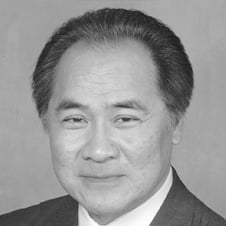AMA member Samuel Lin, MD, PhD, has amassed a career so brimming with achievements that one might think he had his life entirely mapped out by the time he graduated from medical school, in 1975.
It has included more than 10 progressively advancing federal service jobs over 21 years; appointments to over 20 commissions, committees and boards; and honors and awards from more than 30 universities, federal agencies and other organizations, including the AMA Foundation Medical Leadership Award in 2008. He has also worked in the corporate sector and established a consultancy for domestic and global health care ventures. If all of that wasn’t enough, he earned a master’s degree in public administration in his 50s and a master’s in business administration with a focus on medical services management in his 60s.
He has served in the AMA House of Delegates as alternate delegate or delegate for two societies and now chairs the Oversight Committee of the U.S. Department of Defense’s U.S. Family Health Plan Northwest. Dr. Lin also teaches graduate health policy and health care systems on an adjunct basis.
But even at 79, Dr. Lin isn’t done working. In fact, two years ago, he took on a new challenge: chairing the AMA Senior Physicians Section Governing Council, which he sees as an opportunity to expand the conversation on issues affecting senior physicians as well as for all older adults.
“The competency issue is the one that clearly affects physicians, but we also experience declining health or the declining health of someone in the family, and our whole lives get turned around,” he said in an interview at the most recent AMA Interim Meeting. “Medicare, loneliness, hearing loss—all seniors have these concerns, not just physicians.”
Another item at the top of Dr. Lin’s agenda is helping physicians navigate the profession after they turn 65. But instead of drawing only on what he has gone through since he crossed that threshold himself, he pulls from experiences throughout his career.
3 words to live by
“Network, network, network,” Dr. Lin said. “Everything that transpired for me was because of networking.”
One of the earliest examples was when he was in medical school and got involved in activism through an offshoot of the AMA called the Student American Medical Association. Through SAMA, he met the clinical director of the National Health Service Corps, who invited him to join the organization as a student assistant. Dr. Lin spent nine months between his second and third years in the Corps’ office helping to write the rules for the scholarship program.
“It wasn’t anything I could have planned,” he said, noting that the experience appealed to him for the real-time leverage and outcomes he could produce.
“There's a comfort zone that I had in one-to-one interactions,” he noted. “For a family physician, the one to one is the physician and the patient, or maybe the physician and the family, or maybe the physician and the community. In policy, it's one to n. You have no idea what the n is, but you know that if you do a good job and make programs available, that n is going to be great.”
That set him on a course through federal service that eventually included positions as rear admiral and assistant surgeon general in the U.S. Public Health Service and deputy assistant secretary for health in the U.S. Department of Health and Human Services (HHS).
Then, when his identical triplet daughters all went off to college in 1994, he realized he would likely need a higher-paying job than what he could find in government. Around the same time, a former assistant secretary for health at HHS, for whom Dr. Lin had worked, had become the CEO at the pharmaceutical manufacturing firm The Upjohn Co.
“If it wasn't for him, nobody at the company would have known me. And thank God for that, because he passed away while I was still in my last year in government,” Dr. Lin said, noting that Upjohn then offered him a new position, as executive director for federal medical affairs.
Do something out of character
Part of networking is getting out of your comfort zone, Dr. Lin noted. That starts with seeing yourself as more than a physician.
“Say you've been in clinics your whole career. It can be scary to think about doing something else,” he said. “But consider what you've learned: meaningful problem solving. Every patient is a mini thesis, by God. So you think about that and then say: I've got the talent to solve problems, and no matter what project you give me, it's a problem that has to be solved.”
It’s also important to have an idea of the many ways you can be helpful to others and to show initiative.
“Not to be silly about this, but if you don't think you're the greatest thing since Swiss cheese, nobody else is going to. So you have to sell yourself,” Dr. Lin said. “That doesn't mean you’ll bat a thousand. Not everyone will want what you’re selling, but somebody will. You just have to go for it.”
As a final word, Dr. Lin suggested that as one “goes for it,” it’s essential to remember the wise words most famously sung by country musician Tim McGraw: “Be humble and kind.”
Learn more about the AMA Senior Physicians Section, which gives voice to and advocates on issues that impact senior physicians, who may be working full time or part time or be retired.




